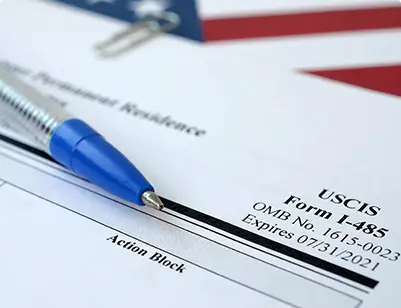Navigating the complexities of immigration law can be overwhelming. At BCA Law Firm, our dedicated team of experts is here to guide you every step of the way.
Don’t face this journey alone – contact us today for a consultation and let us turn your immigration goals into reality.
- Mon - Fri 09:00-17:00

Notice of Intent to Deny - NOID from USCIS
Receiving a Notice of Intent to Deny or NOID from USCIS in response to an immigration petition can be very stressful and disappointing for the individual filing the petition. But it’s not all bad news – receiving an immigration NOID does not mean your application has been denied. By working closely with an experienced immigration lawyer, you can ensure approval after NOID regarding your immigration application.
If you recently received a Notice of Intent to Deny, it’s important to understand and weigh all of your options, along with the steps you can take to have your application approved. Regardless of the immigration petition you applied for, NOIDs can be countered by providing additional evidence that was not included within the initial application. NOIDs can also be rebutted by presenting legal grounds as a new basis to support granting the application. The most important thing you can do is to act quickly and effectively within the legal time frame – this is why it’s crucial to contact an immigration lawyer as soon as possible.
What is a Notice of Intent to Deny from USCIS?
A Notice of Intent to Deny from USCIS to a petitioner indicates that the evaluating officer plans to deny the petition on the basis of fundamental ineligibility for the visa you have applied for. This response can follow all types of applications, including work permits, adjustment of status petitions and visa petitions.
NOIDs can be issued for a variety of reasons. In some cases, they could result from a lack of evidence provided to support the application or a failure to establish that the applicant is deserving of favorable exercise of discretion. In other cases, new evidence may come to light and make a previously approved case deniable by the USCIS. This could be based on different factors such as the applicant having a criminal conviction or committed violations of U.S. Immigration Law.
Receiving a NOID on your petition does not mean that the application has been denied. NOIDs are issued to provide applicants with a better understanding of USCIS’s concerns and reasons as to why they intend to deny the petition. You will still have a chance to remedy any issues within a certain time frame.
What does a NOID mean for your Green Card application?
A Notice of Intent to Deny means that your immigration application or petition has been reviewed by the USCIS and it will not be approved. To put it simply, a NOID indicates that, based on the information submitted and available at the time of the review, a preliminary decision has been made and you do not qualify for approval based on a perceived ineligibility.
The main idea behind the NOID is to share information with the applicant – such as the reasons why their petition was not approved, in order to discourage applicants from using different routes such as appeals or different legal motions to have their application reviewed by the court system.
The applicant can respond to the Notice of Intent to Deny by submitting a defense in response to the different reasons for denial – this can only be done within a certain timeframe. By working with an experienced immigration lawyer, you can gather additional evidence that can influence the outcome of the case in your favour.
Both NOIDs and RFEs offer you the chance to provide further evidence and information but there is a difference in the meaning between the two – NOID and Request for Further Evidence or RFE. A Request for Further Evidence can be interpreted as the immigration officer in charge of your petition being unable to decide if it can be approved. NOIDs are generally less favorable for applicants as the adjudicator is informing you of his intention to deny the application, petition or request, unless further evidence or information is provided.
NOIDs should never be ignored since they are a time-sensitive issue, but in the same time it’s important not to panic. At this stage your application has not been denied and you have the opportunity to remedy issues, provide information and evidence to support your claim.
Your response needs to prove that you are fully eligible for the visa or change of status you filed for.
- In order to overturn the NOID, you must work within the legal timeframes. You have 30 days to respond to the USCIS.
Immediately after receiving the notice, make a note of the due date – you will have to ensure that your response is received before the deadline passes. The recent pandemic offered some NOIDs a degree of flexibility but the most sensitive thing to do in any case is to contact an immigration lawyer that can provide you with more information.
- If you do not respond to the NOID with more information and evidence by the time of your deadline, you will receive a Notice of Action stating your application is denied.
Given the technical and intricate nature of immigration law and the evidentiary and procedural requirements, it’s always a good idea to submit your case to an experienced immigration attorney that’s familiar with NOIDs. After carefully reviewing your case, your lawyer can advise you on the documents you need to compile as part of your response to USCIS.
The Notice of Intent to Deny will provide you with the reasons why USCIS intends to deny your petition. The list of reasons is critical, as it offers insight into USCIS’s decision making – the list is the starting point for considering your response options on which you can build your case.
The response you submit to USCIS must address any of the issues that were raised as the basis for a denial of your petition. Partial responses, more often than not, are not sufficient to ensure approval after NOID. It’s important to note that you shouldn’t leave anything to chance when dealing with a NOID from USCIS – you and your lawyer must carefully gather and submit extensive evidence for each separate reason stated within the notice.
While building your response, you should take an “over-evidencing” approach to all issues and concerns raised by USCIS. Depending on your personal circumstances and the issues associated with your petition, documents may be needed regarding qualifications or previous marriages. This could entail sourcing additional documentation from third parties, which can be rather tedious and time consuming.
As long as the documents are relevant to your case, there is no restriction on the volume or kind of evidence you can submit to support your petition or application. More often than not, experienced lawyers may recommend less obvious documents, based on their experience and personal knowledge of the process.
Along with providing new evidence and documents, you may have to revise and closely review documents you already submitted to USCIS, if they have not been eloquent enough in communicating certain information. For example, if you are applying for the E-2 investor visa, your business plan may require certain revisions in different areas such as budgeting and forecasting. In this particular case, you should ensure that the changes and updates are included in a schedule or simply referenced in the covering letter for improved clarity.
More often than not, your response to the NOID sent by USCIS will be a large bundle of documents. In this case, the covering letter is essential in providing clarification on the content of the new documents and new evidence submitted, as well as new revisions or changes made to the documents.
NOIDs usually take months to process and in some cases, even years. Once the USCIS received your response, they will begin processing your updated petition. With the new evidence presented to them, they will review your petition and come to a conclusion.
It’s important to note that during this time you may need to apply to extend your current visa to remain a lawful immigrant. The petition to extend your visa also has a separate deadline which needs to be taken into consideration.
If your application is denied after responding to the Notice of Intent to Deny, your options usually vary depending on the type of visa you applied for.
The denial notice will inform you if you can appeal the decision and where you can file it. An experienced immigration lawyer can better help you understand your options and the best solution for your case. For example, you may be able to opt for other immigration options or make a legal motion to reopen your case – these routes can lead to your petition’s approval after NOID.

